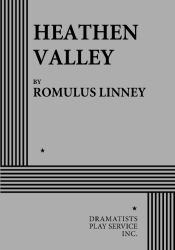
THE STORY: Set in the 1860s, the action of the play centers on the desire of the Episcopal Bishop of North Carolina to bring the word of God to a valley so remote and untamed that brothers marry sisters and the people live lives of brutal violence and grinding poverty. Accompanied by an ex-convict named Starns, who once lived in the area and knows its ways, and a young orphan boy, Billy, the sometimes overbearing bishop sets about bringing “order and decency” to the valley. Returning to civilization to raise funds, he leaves Starns behind as his deacon, and before long Starns, aided by Billy, has indeed worked wonders—transforming a wild woman and her deranged lover into a respectable married couple, leading the grizzled mountaineers in hymns and building a church which, to allay local superstitions, has no corners. When the bishop returns he is amazed, but also disturbed that perhaps earthly pleasures are replacing the poverty that is more befitting for beholding the glory of God. He also announces that he has decided to renounce his calling and embrace the Roman church—which leaves Starns bereft of his illusive authority and, ironically, powerless to halt the slide of his now questioning flock back to the easy and evil ways of old.
Winner of the American Theatre Critics Association Award for Distinguished Playwriting.
A powerful, picaresque and richly humorous study of backwoods religion which has enjoyed widespread success in the nation’s leading regional theatres. Dealing with the determination of the Episcopal Bishop of North Carolina to bring the solace and order of organized religion to “the valley that forgot God,” the play is both a parable of the good which Christianity can bestow and of the disillusion which can result when its tenets are applied without compassion.
“…a significant new play by a major American dramatist…” —Philadelphia City Paper.
“a compelling drama…This is theatre you can sink your teeth into.” —Philadelphia Journal.
“Mr. Linney continues to be one of our most perceptive chroniclers of the folkways of rural America, finding humanity and nobility in the most remote of places.” —The New York Times.
“He has given to us a most minor masterpiece.” —Philadelphia Daily News.
